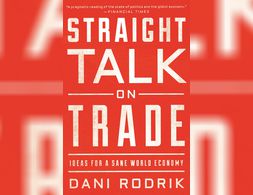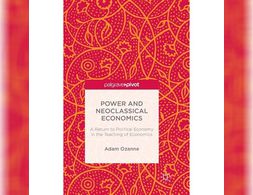✕
605 results
This report to the DEFRA summarizes the main approaches, opportunities and difficulties that come with individual carbon trading.
Dani Rodrik reflects in this book on important questions about how economics works and what might be wrong with it. He points out flaws and weakness of the discipline, but also argues that certain criticisms which have brought forward against are without merit. His central point is that there is not just one economic model, but a variety of them and it is important to apply judgment when selecting the most suitable one for a particular situation.
This essay deals with the concepts of Sustainable Land Management (SLM) and Land Degradation Neutrality (LDN).
As seen with the United Nations significant promotion of the Sustainable Development Goals (SDGs) in the past few years, the issue of global development is of growing concern to many international organizations. As humanity continues to become more interconnected through globalization, the inequalities and injustices experienced by inhabitants of impacted countries becomes increasingly clear. While this issue can be observed in the papers of different types (e.g., different schools of thought) of economists throughout the world, the work of behavioral and complexity economists offer a unique, collaborative perspective on how to frame decisions for individuals in a way that can positively reverberate throughout society and throughout time.
What are the implications of the politics of "behavioural change"? Alexander Feldmann took a closer look for you on nudging and framing and if this is a legitimate instrument being used by the state to make us behave better in terms of our carbon footprint.
An essay of the writing workshop on contemporary issues in the field of Nigerian economics: Labour and all the dynamics, such as laws, mobility, gender participation, regulation etc., that are associated with it cements the need for this paper which seeks to objectively review, analyse, and if deemed necessary, give plausible recommendations.
Here we look at the effect of the 2008 Climate Change Act passed in Parliament in the United Kingdom as an effort to curb emissions in all sectors. The Act aside from setting goals to become a low-carbon economy sets up an independent committee on Climate Change to ensure the implementation of policies to comply with the ultimate goal of 80% reduction in total emissions in 2050. I make use of the Synthetic Control Method (SCM) to create a comparative case study in which the creation of a synthetic UK serves as a counterfactual where the treatment never occurred (Cunningham, 2018).
How do people make decisions? There is a class of models in psychology which seek to answer this question but have received scant attention in economics despite some clear empirical successes. In a previous post I discussed one of these, Decision by Sampling, and this post will look at another: the so-called Fast and Frugal heuristics pioneered by the German psychologist Gerd Gigerenzer. Here the individual seeks out sufficient information to make a reasonable decision. They are ‘fast’ because they do not require massive computational effort to make a decision so can be done in seconds, and they are ‘frugal’ because they use as little information as possible to make the decision effectively.
Environmental catastrophe looms large over politics: from the young person’s climate march to Alexandria Ocasio-Cortez’s Green New Deal, increasing amounts of political space are devoted to the issue. Central to this debate is the question of whether economic growth inevitably leads to environmental issues such as depleted finite resources and increased waste, disruption of natural cycles and ecosystems, and of course climate change. Growth is the focal point of the de-growth and zero-growth movements who charge that despite efficiency gains, increased GDP always results in increased use of energy and emissions. On the other side of the debate, advocates of continued growth (largely mainstream economists) believe that technological progress and policies can ‘decouple’ growth from emissions.
Feminist economics is a key component of the movement for pluralism in economics and one that has, to some extent, been acknowledged by the mainstream of the profession. It seeks to highlight issues which affect women because (it claims) they have not traditionally been recognised in a field dominated by men. On top of this, it seeks to carve out a space for women in the discipline, both for intrinsic reasons of fairness and diversity and because it means that women’s issues are more likely to be highlighted going forward.
An essay of the writing workshop on Nigeria’s Readiness for and the Effect of the Fourth Industrial Revolution
If there’s one method economists have neglected the most, it’s qualitative research. Whereas economists favour mathematical models and statistics, qualitative research seeks to understand the world through intensive investigation of particular circumstances, which usually entails interviewing people directly about their experiences. While this may sound simple to quantitative types the style, purpose, context, and interpretation of an interview can vary widely. Because of this variety, I have written a longer post than usual on this topic rather than doing it a disservice. Having said that, examples of qualitative research in economics are sadly scant enough that it doesn’t warrant multiple posts. In this post I will introduce qualitative research in general with nods to several applications including the study of firm behaviour, race, Austrian economics, and health economics. More than usual I will utilise block quotes, which I feel is in the spirit of the topic.
Exploring Economics, an open-access e-learning platform, giving you the opportunity to discover & study a variety of economic theories, topics, and methods.
“Economics is the science which studies human behaviour as a relationship between ends and scarce means which have alternative uses1.” This is how Lionel Robbins came to define economics in the early 1930s and there is a good chance that many of you heard a variant of this definition in your first Economics 101 lecture.
This archive contains open access copies of most of the written work, including the books of Karl William Kapp (1910-1976) was one of the forefathers of Ecological Economics.
The goal of the course is to deepen students’ understanding of the Latin American development experience by viewing it through a gender lens.
El programa de estudios ofrece una visión general de los contenidos del módulo Género y Economía de la Universidad de Buenos Aires.
Photo by Alina Grubnyak on Unsplash Networks are ubiquitous in our modern society The World Wide Web that links us to and enables information flows with the rest of the world is the most visible example It is however only one of many networks within which we are situated Our …
This syllabus provides an overview of the content of the Philosophy and Economics course at the University of Waterloo.
This syllabus provides an overview of the content of the Philosophy of Economics course at the University of Wisconsin-Madison.
Ecological economics explores new ways of thinking about how we manage our lives and our planet to achieve a sustainable, equitable, and prosperous future. Ecological economics extends and integrates the study and management of both "nature's household" and "humankind's household"—An Introduction to Ecological Economics, Second Edition, the first update and expansion of this classic text in 15 years, describes new approaches to achieving a sustainable and desirable human presence on Earth.
The complex economic problems of the 21st century require a pluralist, real-world oriented and innovative discipline of economics that is capable of addressing and teaching these issues to students. This volume is a state-of-the-art compilation of diverse, innovative and international perspectives on the rationales for and pathways towards pluralist economics teaching.
An honest discussion of free trade and how nations can sensibly chart a path forward in today’s global economy.
Diane Perrons and Sigrid Stagl combine feminist and critical environmental economics perspectives to develop a critique of the free market growth model and offer new ideas for a more sustainable gender equitable model of development in the interests of all.
Immanuel Wallerstein provides a concise and accessible introduction to the comprehensive approach that he pioneered thirty years ago to understanding the history and development of the modern world.
Mainstream economics almost completely ignores the role power plays in determining economic outcomes, which means it can only provide partial explanations of the distribution of wealth and income, and of the problems associated with inequality and poverty.
Focusing on Kenya’s path-breaking mobile money project M-Pesa, this book examines and critiques the narratives and institutions of digital financial inclusion as a development strategy for gender equality, arguing for a politics of redistribution to guide future digital financial inclusion projects.
Racism and discrimination have choked economic opportunity for African Americans at nearly every turn. In From Here to Equality, William Darity Jr. and A. Kirsten Mullen confront these injustices head-on and make the most comprehensive case to date for economic reparations for U.S. descendants of slavery.
When Santa Fe Institute Scientists first started working on economics more than thirty years ago, many of their insights, approaches, and tools were considered beyond heterodox. These once-disparaged approaches included network economics, agents of limited rationality, and institutional evolution—all topics that are now increasingly considered mainstream.
The relationship between race and capitalism is one of the most enduring and controversial historical debates. The concept of racial capitalism offers a way out of this impasse.
In this lecture, Sanjay Reddy reviews the work of János Kornai, especially his critique of the socialist system, which is rooted in his understanding of the eminently political character of socialism.
Popularized by movies such as A Beautiful Mind game theory is the mathematical modeling of strategic interaction among rational and irrational agents Over four weeks of lectures this advanced course considers how to design interactions between agents in order to achieve good social outcomes Three main topics are covered social …
Necesitamos cookies. Pincha en “Aceptar” para ayudarnos a hacer de Exploring Economics una mejor plataforma.





























